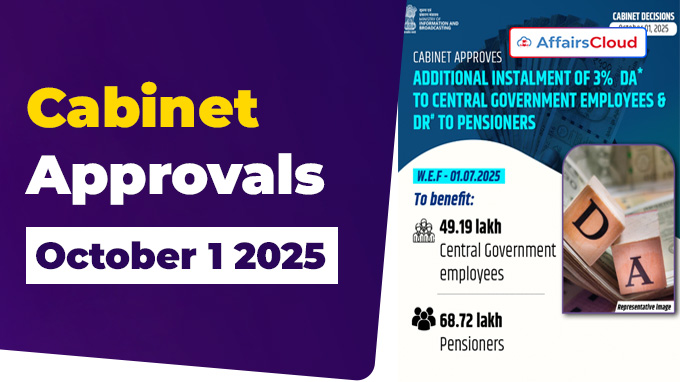In September 2025, the Union Cabinet chaired by Prime Minister (PM) Narendra Modi, has approved the approval the following proposals:
- The 3rd phase (Phase-III) of the Biomedical Research Career Programme (BRCP) which is expected to be implemented for a period of 6 years (from 2025-26 to 2030-31), with an additional time period of 6 years i.e. from 2030-31 to 2037-38.
- The Cabinet Committee on Economic Affairs (CCEA) chaired by PM Narendra Modi, has approved the widening and improvement of 85.675 kilometer (km)-long Kalibor-Numaligarh section of National Highway (NH)-715 in Assam to a 4-lane NH, with total budget outlay of Rs 6,957 crore.
- CCEA approved the opening of 57 new Kendriya Vidyalayas (KVs) under civil sector across the country, with total outlay of over Rs 5,862 crore.
- 3% Hike in Dearness Allowance (DA) for Central Employees and Dearness Relief (DR) for Pensioners.
Exam Hints:
- What? Cabinet Approvals
- Approved by: Union Cabinet
- Chaired by: PM Narendra Modi
- Approval-1: Phase-III of BRCP
- Total Cost: Rs 1,500 crore
- Time Period: 6 years (from 2024-26 to 2030-31), with additional time period of 6 years till 2037-38
- Implemented by: DBT and Wellcome Trust (WT), the UK
- Implemented through: Indian Alliance, a dedicated SPV
- Approval–2: Widening and improvement of the Kalibor-Numaligarh section of National Highway (NH)-715 (in Assam) to 4-lane NH
- Approved by: CCEA
- Total Budget Outlay: Rs ,6957 crore
- Total Length: 85.675 km
- Mode of Development: EPC
- Key Constructions: elevated corridor passing through KZNP (34.45 km), widening of long existing road (30.22 km) and greenfield bypasses (21 km) around Bokakhat (9.5 km) and Jakhalabandha (11.5 km).
- Approval-3: Opening of 57 new Kendriya Vidyalayas (KVs)
- Approved by: CCEA
- Estimated Cost: Over Rs 5,862 crore.
- Approval-4: Hike in DA for Central Employees and DR for Pensioners.
- New DA & DR Rate: 58% (+3%)
- Existing Rate: 55%
- Effective from: July 01, 2025
- Impact on Exchequer: Rs 10,083.96 crore
About Phase-III of BRCP:
Background: BRCP was 1st launched by the Government of India (GoI) in 2008-09, followed by a 2nd Phase (Phase-II) in 2018-19, has consolidated India’s position as an emerging hub for biomedical sciences of global repute.
Implementing Organisations: This newly approved programme will be approved by the Department of Biotechnology (DBT) and the Wellcome Trust (WT), the United Kingdom (UK) through India Alliance, a dedicated Special Purpose Vehicle (SPV).
Total Investment: The Phase-III of BRCP will attract a total investment of Rs 1,500 crore, including Rs 1,000 crore from DBT and remaining Rs 500 crore from WT (the UK).
Significance: The new phase of BRCP will nurture top-tier scientific talent, promote interdisciplinary research for translational innovation, and mitigate regional disparities in scientific capacity, to create world-class biomedical research capacity with global impact.
Key Programmes: In Phase-III, 3 key programmes will be implemented:
- Early Career and Intermediate Research Fellowships in basic, clinical and public health are internationally recognised and customized for the formative stages of a research career of a scientist.
- Collaborative Grants Programme which includes career development grants and catalytic collaborative grants for 2-3 investigator teams for early and mid-senior career researchers respectively.
- Research Management Programme, aims to bolster core research endeavors.
Key Focus Areas: The programme will focus on areas like: mentorship, networking, public engagement, and forging new national and international collaborations.
Expected Beneficiaries: The programme will train over 2,000 students and post-doctoral fellows. They will further generate high-impact research and help to commercialize technologies.
Key Targets: To increase 10-15% in support for women researchers; and 25-30% of collaborative programmes to reach Technology Readiness Level(TRL-4+); and to expand footprint activities and engagement in Tier-2 or Tier-3 setting.
Kalibor-Numaligarh Section of NH-715 in Assam:
Development Mode: This newly approved project will be developed in Engineering, Procurement and Construction (EPC) mode.
Key Details: The project will include the construction of an elevated corridor of about 34.45 km, which covers the entire movement of wildlife from Kaziranga National Park (KZNP) to Karbi-Anglong Hills for free and uninterrupted passage of wildlife.
- It further includes the upgradation of 30.22 km of existing road and the construction of 21 km of greenfield bypasses around Bokakhat (9.5 km) and Jakhalabandha (11.5 km).
Better Connectivity: The project will decongest the existing corridor, enhance safety, and provide better connectivity between Guwahati (Assam’s capital city), KZNP (tourist destination) and Numaligarh (an industrial town).
- The project will integrate with 2 major NHs (NH-127 and NH-129) and 1 State NH(SH-35), providing smooth connectivity to key economic, social and logistics nodes across Assam.
- Also, the upgraded corridor is expected to enhance mutli-modal integration by connecting with 3 Railway Stations (Nagaon, Jakhalabandha, Vishwanath Charli), and 3 Airports (Tezpur, Liabari, Jorhat).
Employment Opportunities: The new project is expected to generate nearly 15.42 lakh person-days of direct and 19.19 lakh person-days of indirect jobs.
Key Details of 57 New Kendriya Vidyalayas (KVs):
Estimated Cost: The total estimated cost required for these newly approved KVs is Rs 5,862.55 crore, including capital expenditure component of Rs 2,585.52 crore and operational expenditure of Rs 3,277.03 crore, spread over a period of 9 years starting from 2026-27.
Sponsored by: Out of 57 new KVs, 7 KVs will be sponsored by the Ministry of Home Affairs (MHA) and the remaining 50 KVs will be sponsored by State/Union Territory (UT) authorities.
New KVs across 17 States/UTs: This new approval covers 17 States/UTs across the country.
- Among these 57 new KVs, 20 are proposed to be established in districts where no KV presently exists; 14 KVs will be opened in Aspirational districts, 4 in Left Wing Extremism (LWE) districts and 5 KVs in North Eastern Region (NER)/ Hilly areas.
- This latest sanction for new KVs is the continuation of previous approval of 85 KVs granted in December 2024.
Significance: Each new KV is expected to accommodate nearly 1520 students, thereby bringing the total capacity to 86640 students.
- These newly approved KVs are expected to generate 4617 direct permanent job opportunities.
Background of KVs: The scheme of KVs was approved by GoI in November 1962, aimed at providing educational facilities of uniform standard throughout the country and to cater the educational requirements of wards of transferable and non-transferable employees of central government.
Current Status of KVs: Currently, there are 1,288 KVs, including 03 in abroad i.e. Moscow(Russia), Kathmandu (Nepal), and Tehran(Iran), are operational.
- As of June 30 2025, the enrolment of students in KVs is 13.62 lakh.
- So far, 913 KVs have been designated as Pradhan Mantri Schools for Rising India (PM SHRI) schools, in line with National Education Policy (NEP 2020).
Hike in DA for Central Employees & DR for Pensioners:
Overall Increase: The announcement of new DA and DR marks an increase of 3% (i.e. to 58%) compared to the existing rate of 55% of the Basic Pay/Pension, to compensate against price.
Effective Date: The Hike effective from July 01, 2025, ensures that arrears for 3 months (July, August and September) are credited along with the October salary.
Expected Beneficiaries: This increase is expected to benefit about 49.19 lakh central government employees and 68.72 lakh pensionsers.
Based on: This hike in both DA and DR is in accordance with the accepted formula, which is calculated based on the recommendations of 7th Central Pay Commission, whose tenure will expire in December 2025.
Impact: The cumulative impact on the exchequer on account of an increase in DA & DR will be Rs 10,083.96 crore annually.
About DA &DR:
Bi-annual Revision: Both DA & DR are revised twice in a year by the central government (from 1st January and 1st July) based on the increase in the 12-montly average All India Consumer Price Index for Industrial Workers(AICPI-IW) published by the labour bureau under the Ministry of Labour & Employment (MoL&E).
Previous Hike: The last DA hike of 2% was announced by the GoI in March 2025, from 53% to 55%.
Recent Related News:
In August 2025, the CCEA chaired by PM Narendra Modi had approved 4 railway projects worth Rs 12,328 crore, including, 3 multi-tracking projects covering 4 states such as Bihar, Karnataka, Assam and Telangana; and the construction of new rail line in Kutch, Gujarat.





